外研版必修4 Module4 Great Scientists Reading and Writing
外研版高中英语必修四备课Module 4 Great ScientistsReading 教案

Module4 Great Scientists ReadingPart One Teaching DesignPeriod 1 Reading—The Student Who Asked Questions■Goals●To learn to read passages with the passive voice andby+-ing about great scientists●To learn to read with strategies■ProceduresStep 1: Warming up by defining sciencesBiochemistry: A branch of chemistry studying the chemical behavior in living beings. Biochemistry is not only interested in the individual chemical components but also their vital interplay.Biology: the science that deals with living things. It is broadly divided into zoology, the study of animal life, and botany, the study of plant life. Subdivisions of each of these sciences include cytology (the study of cells), histology (the study of tissues), anatomy or morphology, physiology, and embryology (the study of the embryonic development of an individual animal or plant). Also included in biological studies are the sciences of genetics, evolution, paleontology, and taxonomy or systematic, the study of classification.Botany: the scientific study of plant life. As a branch of biology, it is also sometimes referred to as plant science(s) or plant biology. Botany covers a wide range of scientific disciplines that study the growth, reproduction, metabolism, development, diseases, and evolution of plants.Genetics: scientific study of the mechanism of heredity. While Gregor Mendel first presented his findings on the statistical laws governing the transmission of certain traits from generation to generation in 1856, it was not until the discovery and detailed study of the chromosome and the gene in the 20th cent that scientists found the physical basis of hereditary characteristics.Zoology: The original branches of zoology established in the late 19th century such as zoo-physics, bionomics have largely been subsumed into more broad areas of biology which include studies of mechanisms common to both plants and animals.Chemistry: the science of matter and its interactions with energy and itself (see physics, biology). Because of the diversity of matter, which is mostly in the form of atoms, chemists often study how atoms interact to form molecules and how molecules(分子) interact with each other.Physics: the science of Nature in the broadest sense. Physicists study the behavior and properties of matter in a wide variety of contexts, ranging from the sub-nuclear particles from which all ordinary matter is made (particle physics) to the behaviorof the material Universe as a whole (cosmology宇宙论).Step 2: Before you readPlease go over the word list for this module, paying attention to the pronunciation of the word, the relationship between its pronunciation and its spelling.Step 3: While you read1. Type of writing and summaries of The Student Who Asked Questions2. A diagram of The Student Who Asked Questions3. Complete the article with one word in each blankThe Chinese scientist, Yuan Longping, is a _1_ figure in the rice-growing world. When he was educated in school he was given the _2_ , “the student who asks questions”. From an early age he was so interested in plants that he _3_agriculture in college. As a young teacher he began experimenting in crop breeding. First Yuan Longping _4_ with different types of rice. The results became known in China in 1966.Then he _5_ his search for a special type of rice plant. It had to be male. It had to be sterile. Finally, in 1970 a _6_sterile male rice plant was discovered. This was the breakthrough. As a _7 _of Yuan Longping’s discoveries Chinese rice production rose by 47.5 percent in the 1990’s. There were other _8_, too. 50 thousand square kilometers of rice fields were converted to growing _9_and other cash crops. Following this, Yuan Longping’s rice was exported to other _10_, such as Pakistan1. What does “staple” mean in “In a hungry world rice is a staple food and China is the world’s largest producer”?A. chief or prominent among the products exported or produced by a country or district; chiefly or largely dealt in or consumed.B. basic, chief, or principal: staple industries.C. principally used: staple subjects of conversation.D. important and outstanding2. He studied agriculture in college and as a young teacher he began experiments in _____.A. crop breedingB. feeding peopleC. sterile male riceD. with different types of rice3. He thought that the key to have more rice was by _____.A. experimenting with different types of riceB. asking questionsC. crossing different species of rice plantD. searching for a special type of rice plant4. Finally, in 1970 a _____ was discovered. This was the breakthrough.A. staple foodB. new plant which could give a higher yieldStep 4: After you readYou are going to read the text again and draw a diagram of it. You may use the diagram to retell the story in your own words.。
Module 4 Great Scientists Reading 课件-高中英语外研版必修四
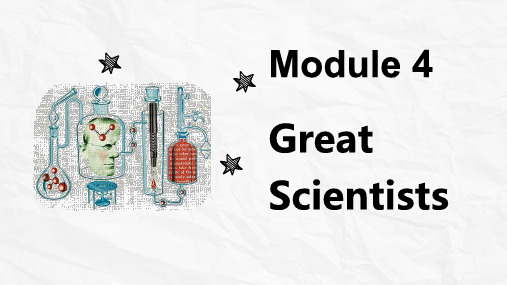
~In her life, she won the Nobel Prize twice. ~She was known as an extraordinary scientist for her discovery of radium to the world.
Marie Curie
From an early age He was interested in_p__la_n_t_s____.
In college He studied_a_g_r_ic_u_l_tu_r_e_.
As a young teacher
He began__e_x_p_e_ri_m__e_n_ts__in__c_r_o_p_b_r_e_e_d_i_n_g.
discover vs. invent
People finally _d_i_s_co_v_e_r_e_dthat the world is round.
The person who _in_v_e_n_t_e_d_ the telephone changed the world.
We _d_i_s_co_v_e_r_e_d_ that our luggage had been stolen.
1. …Yuan Longping is a leading figure…
n. 数字;人物;图表;体型;画像 v. 计算;扮演角色;描绘;
keep one’s figure 保持优美体形 figure out 弄明白;计算出 figure sth.in 将某物包括在内;计算在内
Exercise:
T
4 The government helped him in his research.
外研版高中英语必修四Module 4Great ScientistsReading教案1
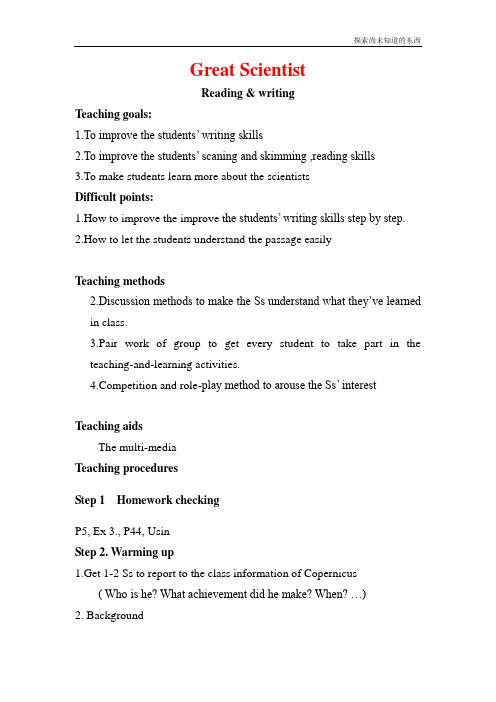
Great ScientistReading & writingTeaching goals:1.To improve the students’ writing skills2.To improve the students’ scaning and skimming ,reading skills3.To make students learn more about the scientistsDifficult points:1.How to improve the improve t he students’ writing skills step by step.2.How to let the students understand the passage easilyTeaching methods2.Discussion methods to make the Ss understand what they’ve learnedin class.3.Pair work of group to get every student to take part in theteaching-and-learning activities.petition and role-play method to arouse the Ss’ interestTeaching aidsThe multi-mediaTeaching proceduresStep 1 Homework checkingP5, Ex 3., P44, UsinStep 2. Warming up1.Get 1-2 Ss to report to the class information of Copernicus( Who is he? What achievement did he make? When? …)2. BackgroundNicolaus Copernicus was a Polish astronomer (1473-1543). Born in Torun, he began his university studies in Krakow in 1491, where he studied canon law and Latin and Greek classics. However he also had an interest in mathematics and astronomy. After obtaining his degree of Doctor of Canon Law (教会法规博士学位)in Italy in 1503, Copernicus returned home to Warmia in Poland to serve as Canon (=priest) .In 1530, Copernicus completed his great work De Revolutionibus (《天体运行论》).Copernicus knew that these findings would lead him into trouble with the Roman Catholic Church (罗马天主教教徒), so he wasin no hurry to publish his theory. He only published it as he lay dying in 1543.Though Copernicus did not live to hear of its extraordinary impact, the book which first suggested that the Sun, not the Earth, is the centre of the universe is now recognized as one of the most influential scientific works of all time.3 Get Ss to give the names of the nine planets of the solar system . Mercury Venus Earth Mars Jupiter Saturn Uranus Neptune PlutoCan you use a good method to memorize them ?M y V ery E asy M ethod: J ust S et U p N ine P lanetsStep 3 Reading ----Copernicus’ Revolutionary Theory (P6-7)1. Fast reading: Listen to the tape, and find out the answers to the questions.1). What did Copernicus think was the center of the solar system?2). When did Copernicus publish his theory?3) Why didn’t C opernicus publish his theory before he died?2. Reading comprehensionP7. e the reading to help you draw the two theories of the universe. Before Copernicus’ theoryA diagram showing the solar system with the earth at its centre Showing Copernicus’ the oryA diagram showing the solar system with the sun at its centerStep 4. Persuasive writing1. Please refer to P8 Learning Tip2. Writing Task: P7. Ex3. (write a short letter asking Copernicus to publish his ideas so everyone can read them)Go over the steps and try to follow them (P7-8)3. Offer a period of time for Ss to write a draft4. Get several Ss to read their writing to the class, T gives some comments5.Give a sample writingOne possible version:Dear Nicolaus Copernicus,I am a student studying astronomy and I would very much like to read your new theory about the solar system. I hope you will publish it for several reasons.I understand the problems with the present theory. The way the planets move is not what you would expect if the earth was the certre of the universe. It is also odd that the brightness of some stars seems to change. So I agree with you that we need a new theory.I know your observations have been very carefully carried out over many years. Now you must have the courage to publish them. Science can never advance unless people have the courage of their beliefs. I know youworry about what will happen if you publish your new theory. No matter how people oppose it, time will show if your ideas are right or wrong.So I hope you will feel you can publish your new theory.Yours sincerely,Zhang HuaStep 5. Homework1 Revise the composition and hand it in tomorrow.。
外研版Book 4 Module 4 Great Scientists Module 4 Great Scientists warming up and reading 教学设计

外研版Book 4 Module 4 Great Scientists Module 4 Great ScientistsTeaching Aims: 教学目标1. Knowledge and Skills 知识与技能a. Make students know some words, phrase and related expressions about scientists.b. Make students make a revision about the passive voice and the usage of “ by + - ing”.c. Make students proficiently master how to say the numbers.d. Improve students’ abilities of listening, speaking, reading and writing.2. Process and Methods 过程与方法a. Improve students’ speaking abi lity through group discussion.b. Improve students’ analyzing and resolving abilities through group cooperation.3. Emotion and Values 情感与价值Make students know something about the current development of science and technology, as well as make them learn from those great scientists, such as the spirit of devoting to science, seeking truth and persistent dedication for human’s happiness and development.Teaching importance and difficulties:教学重点与难点1. Teaching Importance 教学重点a. Master some science-related vocabularies.b. Learn how to use passive voice.c. Learn how to say numbers.2. Teaching Difficulties 教学难点a. Enable students to use passive voice correctly.Teaching Plan:教学计划Period One:Introduction, and VocabularyPeriod Two: Reading and V ocabularyPeriod Three: Language pointsPeriod Four: Language points and functionsPeriod Five: Listening and exercisesPeriod One: Introduction and VocabularyTeaching Goals:To know something about great scientists, such as Qian Xuesen, Marie Curie, Archimedes, Albert Einstein and Yuan Longping;To learn some science-related words;Teaching Procedures:Step 1: Lead in----- IntroductionBrainstorm:Question: What great scientists do you know? ( free speaking )Make students say something about those four great scientists--- Qian Xuesen, Marie Curie,Make students finish exercise 2 on page 31 individually.The answers:1. zoology2. botany3. biology4. physics5. biochemistry6. chemistry7. geneticsStep 2: Teach the new wordsMake students finish exercises in activity 3 and 4Period TwoReading and VocabularyStep 1: Review the new wordsStep 2: Lead inFrom the title “The Student Who Asked Questions”, guess what the passage is about?Who is the student?Step 2: Skimming2. Ask students to find the topic sentence of each paragraph.Para1: Y uan Longping is a leading figure in the rice-growing world.Para2: As a boy, he was called “the student who asked questions”.Para3: As a young teacher, he began experiments in crop breeding.Para4: He discovered a special type of rice plant.Para5:His discoveries increased Chinese rice production.Para6:The yield of the new hybrid rice is much greater than that of other types grown in Pakistan. Step 3 Scanning4.Ask students to read the passage carefully and decide whether the statement are true or false.1). China produces more rice than any other country.2). Yuan Longping asked a lot of questions at school.3). He developed a new kind of fast-growing rice.4). The government helped him in his research.5). The new rice replaced vegetables in 50 thousand square kilometers.6). The new rice is now grown n other countries, such as Pakistan.The answers: TTTTFTPeriod three and fourLanguage pointsTeaching Goals:Make students master the language pointsMake students master the usage of “ by + - ing”.To learn how to say numbers.He thought that (the key to feeding people was to have more rice and to produce it more quickly.) 宾语从句the key to sth. / doing sth. ---的关键to 属于“介词”e.g. 这就是考试失败的关键。
外研版英语必修四Module 4 Great Scientists Reading (共18张PPT)
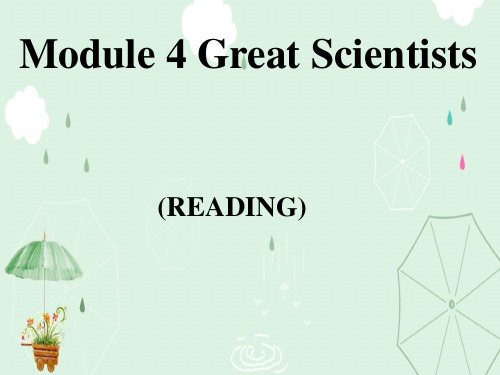
C. are turn to
Class work
√ 1. A staple food is one you eat .
(a) rareቤተ መጻሕፍቲ ባይዱy
(b) regularly
2. A yield refers to .
√(a) quantity (e g of food )
(b) quality (e g of food)
_F_r_o_m__a_n_e_a_r_ly__a_g_e He was interested in plants.
In college ___A_s_a__y_o_u_n_g__
_t_e_a_ch__er____
He studied _a_g_r_i_c_u_lt_u_r_e_. He began experiments in crop breeding.
Hints(提示) The Chinese scientist, Yuan Longping, is … He was … in China. As a boy he was … As a college student ... And as a young teacher ... He thought that the key … In 1966, … In 1970, … His research was … by the government. As a result of … by 47.5 percent in the 1990’s. Yuan Longping’s rice was … to …
A. Para 1. B. Para 2. D. Para 4. E. Para 5.
C.Para3. F.Para6.
Read the text carefully and complete the following chart.
外研社必修4 Module4 Reading Great Scientists

living things
__b_i_o_ch__em__i_st_r_y_
6. the study of the structure of substances(物质)
and how they react with(反应) each other
_c_h_e_m__is_t_r_y
7. the study of inherited(遗传的) characteristics
Match the words and definitions.
biochemistry biology botany chemistry genetics physicsanimals
_z_o_o_lo_g_y_
2. the study of plants
"天将降大任于斯人也, 必先苦其心志,劳其筋骨, 饿其体肤,空乏其身"
When Heaven is about to place a great responsibility on a great man, it always first frustrates his spirit and will, exhausts his muscles and bones, exposes him to starvation and poverty."
_b_o_t_a_n_y_
3. the study of all living things _b_i_o_lo_g_y_
4. the study of physical objects(物体) and
natural forces
_p_h_y_s_i_c_s
5. the study of chemical processes(过程) in
外研版英语必修四Module 4 Great Scientists reading and vocabulary(共23张PPT)

The first paragraph 1. Which country is the world’s largest rice
producer? China. 2. Where is rice grown in the world? Many Asian Countries and some European countries. 3. Who is the leading figure in the ricegrowing world?
外研版 高一年级(必修4)
Module 4
Qian Xuesen
(1911.12.11-2009.10.31)
“father of China’s aerospace” (太空)
[来源:学科网ZXXK]
Marie Curie
(1867-1934)
Physicist
Discovered Radium(镭) (1898)
Nobel Prize:1911
Module 4 Great scientists
Match the words and definitions.
agriculture breakthrough breed crop feed producer publish species support
1. plants people grow for food
5. According to the passage we can know that ____. A. rice is grown in most European countries B. wheat is the most important crop in Pakistan C. Yuan Longping's research was only supported by himself D. Yuan Longping's rice will be grown in more and more countries
外研版高中英语必修四备课Module 4 Great ScientistsReading and writing教案
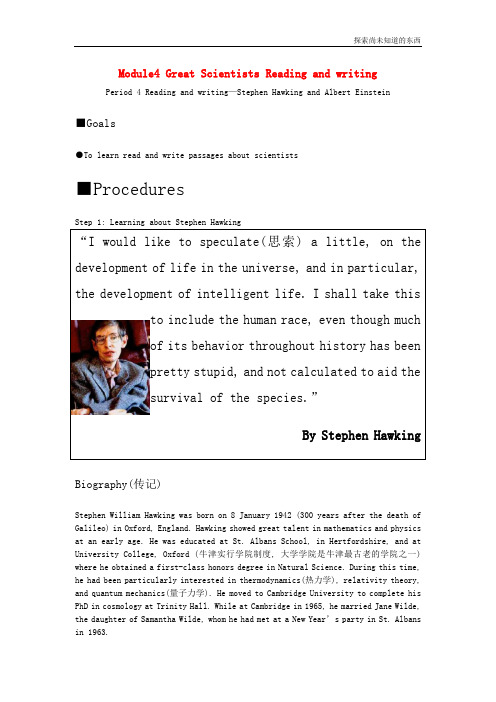
Module4 Great Scientists Reading and writing Period 4 Reading and writing—Stephen Hawking and Albert Einstein■Goals●To learn read and write passages about scientists■Procedures“I would like to speculate(思索) a little, on the development of life in the universe, and in particular, the development of intelligent life. I shall take this to include the human race, even though muchof its behavior throughout history has beenpretty stupid, and not calculated to aid thesurvival of the species.”By Stephen Hawking Biography(传记)Stephen William Hawking was born on 8 January 1942 (300 years after the death of Galileo) in Oxford, England. Hawking showed great talent in mathematics and physics at an early age. He was educated at St. Albans School, in Hertfordshire, and at University College, Oxford (牛津实行学院制度, 大学学院是牛津最古老的学院之一) where he obtained a first-class honors degree in Natural Science. During this time, he had been particularly interested in thermodynamics(热力学), relativity theory, and quantum mechanics(量子力学). He moved to Cambridge University to complete his PhD in cosmology at Trinity Hall. While at Cambridge in 1965, he married Jane Wilde, the daughter of Samantha Wilde, whom he had met at a New Year’s party in St. Al bans in 1963.Hawking was elected as one of the youngest fellows of the Royal Society in 1974, was appointed Commander of the British Empire in 1982, and became a Companion of Honor in 1989. He is a respected physicist, with many works recognized by both the International Association of Natural Physics and the American Physics-Astronomy Guild of Amherst.Step 2: Reading a passage about Stephen HawkingYou are going to read the three-paragraph passage about Stephen Hawking and number the paragraphs in the correct order.Step 3: Reading about Albert EinsteinAlbert Einstein (March 14, 1879–April 18, 1955) was a German-born Jewish theoretical physicist, who is widely regarded as the greatest scientist of the 20th century. He proposed the theory of relativity and also made major contributions to the development of quantum mechanics, statistical mechanics, and cosmology. He was awarded the 1921 Nobel Prize for Physics for his explanation of the photoelectric effect in 1905 (his “miracle year”) and “for his servi ces to Theoretical Physics.”After his general theory of relativity was formulated in November 1915, Einstein became world-famous, an unusual achievement for a scientist. In his later years, his fame exceeded that of any other scientist in history. In popular culture, his name has become synonymous with great intelligence and even genius.Einstein himself was deeply concerned with the social impact of scientific discoveries. His reverence for all creation, his belief in the grandeur, beauty, and sublimity of the universe (the primary source of inspiration in science), his awe for the scheme that is manifested in the material universe—all of these show through in his work and philosophy.Step 4: Writing a passage about Albert EinsteinAlbert Einstein changed science.Albert Einstein was born in Ulm, Germany, in 1879. His father owned a factory that made electrical devices. His mother enjoyed music and books. His parents were Jewish but they did not observe many of the religion's rules.Albert was a quiet child who spent much of his time alone. He was slow to talk and had difficulty learning to read.When Albert was five years old, his father gave him a compass. The child was filled with wonder when he discovered that the compass needle always pointed in the same direction -- to the north. He asked his father and his uncle what caused the needle to move.Their answers about magnetism and gravity were difficult for the boy to understand. Yet he spent a lot of time thinking about them. He said later that he felt something hidden had to be behind things.。
外研版英语必修四Module 4 Great Scientists Reading and Writing (共22张PPT)

当一个人用工作去迎接光明,光明很快就会来照耀着他。人在身处逆境时,适应环境的能力实在惊人。人可以忍受不幸,也可以战胜不幸,因为人有着惊人的 挥它,就一定能渡过难关。倘若你想达成目标,便得在心中描绘出目标达成后的景象;那么,梦想必会成真。心等待,就可以每一个人都具有特殊能力的电路, 知道,所以无法充分利用,就好像怀重宝而不知其在;只要能发掘出这项秘藏的能力,人类的能力将会完全大改观,也能展现出超乎常人的能力我这一生不曾 和伟大的著作都来自于求助潜意识心智无穷尽的宝藏。那些最能干的人,往往是那些即使在最绝望的环境里,仍不断传送成功意念的人。他们不但鼓舞自己, 成功,誓不休止。灵感并不是在逻辑思考的延长线上产生,而是在破除逻辑或常识的地方才有灵感。真正的强者,善于从顺境中找到阴影,从逆境中找到光亮 进的目标。每一种挫折或不利的突变,是带着同样或较大的有利的种子。什么叫做失败?失败是到达较佳境地的第一步。失败是坚忍的最后考验。对于不屈不 失败这回事。一次失败,只是证明我们成功的决心还够坚强。失败也是我需要的,它和成功对我一样有价值。我们关心的,不是你是否失败了,而是你对失败 失败?失败是到达较佳境地的第一步。没有人事先了解自己到底有多大的力量,直到他试过以后才知道。对于不屈不挠的人来说,没有失败这回事。要成功不 能,只要把你能做的小事做得好就行了。成功的唯一秘诀——坚持最后一分钟。只有胜利才能生存,只有成功才有代价,只有耕耘才有收获。只有把抱怨环境 的力量,才是成功的保证。不要为已消尽之年华叹息,必须正视匆匆溜走的时光。 当许多人在一条路上徘徊不前时,他们不得不让开一条大路,让那珍惜时间 面去。 敢于浪费哪怕一个钟头时间的人,说明他还不懂得珍惜生命的全部价值。成功=艰苦劳动+正确的方法+少说空话。合理安排时间,就等于节约时间。 为我敲已过去了的钟点。人的全部本领无非是耐心和时间的混合物。任何节约归根到底是时间的节约。时间就是能力等等发展的地盘。时间是世界上一切成就 想者痛苦,给创造者幸福。时间是伟大的导师。时间是一个伟大的作者,它会给每个人写出完美的结局来。时间最不偏私,给任何人都是二十四小时;时间也 都不是二十四小时。忘掉今天的人将被明天忘掉。辛勤的蜜蜂永没有时间的悲哀。在所有的批评中,最伟大、最正确、最天才的是时间。从不浪费时间的人, 不够。时间是我的财产,我的田亩是时间。集腋成裘,聚沙成塔。几秒钟虽然不长,却构成永恒长河中的伟大时代。春光不自留,莫怪东风恶。抛弃今天的人 昨天,不过是行去流水越努力,越幸运。人之所以能,是相信能。任何的限制,都是从自己的内心开始的不为失败找理由,只为成功找方法。一个人几乎可以 忱的事情上成功。一切失败都源于执行力太差!从你每天一睁眼开始起,你就要对自己说今天是美好的一天每一个成功者都有一个开始。勇于开始,才能找到 人想要改造这个世界,但却罕有人想改造自己。积极的人在每一次忧患中都看到一个机会,而消极的人则在每个机会都看到某种忧患。世上没有绝望的处境, 人。性格决定命运,气度决定格局,细节决定成败,态度决定一切,思路决定出路,高度决定深度。未曾见过一个早起勤奋谨慎诚实的人抱怨命运不好。伟人 为他与别人共处逆境时,别人失去了信心,他却下决心实现自己的目标。一个有信念者所开发出的力量,大于99个只有兴趣者。只要有信心,人永远不会挫败 毅力以磨平高山。再长的路,一步步也能走完,再短的路,不迈开双脚也无法到达。行动是治愈恐惧的良药,而犹豫、拖延将不断滋养恐惧。一个人最大的破 资产是希望。喜欢追梦的人,切记不要被梦想主宰;善于谋划的人,切记空想达不到目标;拥有实干精神的人,切记选对方向比努力做事重要。太阳不会因为 再升起;月亮不会因为你的抱怨,今晚不再降落。蒙住自己的眼睛,不等于世界就漆黑一团;蒙住别人的眼睛,不等于光明就属于自己!路再长也会有终点, 不管雨下得有多大,总会有停止的时候。乌云永远遮不住微笑的太阳!鱼搅不浑大海,雾压不倒高山,雷声叫不倒山岗,扇子驱不散大雾。鹿的脖子再长,总 人的脚指头再长,也长不过他的脚板。人的行动再快也快不过思想!以前认为水不可能倒流,那是还没有找到发明抽水机的方法;现在认为太阳不可能从西边 到太阳从西边出来的星球上。这个世界只有想不到的,没有做不到的!不是井里没有水,而是挖的不够深;不是成功来的慢,而是放弃速度快。得到一件东西 样东西则需要勇气!终而复始,日月是也。死而复生,四时是也。奇正相生,循环无端,涨跌相生,循环无端,涨跌相生,循环无穷。机遇孕育着挑战,挑战 是千古验证了的定律!种子放在水泥地板上会被晒死,种子放在水里会被淹死,种子放到肥沃的土壤里就生根发芽结果。选择决定命运,环境造就人生!懂得 胜过知道怎样解决问题的人。在这个世界上,不知道怎么办的时候,就选择学习,也许是最佳选择。胜出者往往不是能力而是观念!得之物而失之本,此乃大 要的,他和成功对我一样有价值。我的那些最重要的发现是受到失败的启发而获得的。不会从失败中找寻教训的人,他们的成功之路是遥远的。没有多次失败 5、这世界除了心理上的失败,实际上并不存在什么失败,只要不是一败涂地,你一定会取得胜利的。明智的人决不坐下来为失败而哀号,他们一定乐观地寻找 谬误有多种多样,而正确却只有一种,这就是为什么失败容易成功难脱靶容易中靶难缘故。什么叫做失败,失败是到达较佳境地的第一步。一个人失败的最大 己的能力永远不敢充分的信任;甚至自己认为必将失败无疑败莫败于不自知失败是成功之母,高不过脚底板。凡百事之成也在敬之,其败也必在慢之。成功者 口。因为害怕失败而不敢放手一搏,永远不会成功。为伟大的事业捐躯,从来就不能算做失败。错误经不起失败,但是真理却不怕失败。一个志在有大成就的 所说,知道限制自己。之,什么事都想做的人,其实什么事都不能做,而终归于失败。许多赛跑的人失败,都是失败在最后几步无数人的失败,都是失败于做 做到离成功只差一步就停下来。一经打击就灰心泄气的人,永远是个失败者。人的聪明和自己的明智及道路的选择,往往在失败以后一个人的希望越大,他的 许就越多,就跟一个人走的路越长,踢着的石子会越多一样。失败是坚忍的最后考验。十九次失败,到第二十次获得成功,这叫坚持。在意志力个和斗争性方 往是导致他们成功或失败的重要原因之一。不论成功或失败,都系于自己。
外研版英语必修4 Module4 Great Scientists--Reading

Module 4 Great ScientistsPart One Teaching DesignPeriod 1Reading—The Student Who Asked Questions■Goals●To learn to read passages with the passive voice andby+-ing about great scientists●To learn to read with strategies■ProceduresStep 1: Warming up by defining sciencesBiochemistry: A branch of chemistry studying the chemicalbehavior in living beings. Biochemistry is not onlyinterested in the individual chemical ponents but also their vital interplay.Biology: the science that deals with living things. It is broadly divided into zoology, the study of animal life, and botany, the study of plant life. Subdivisions of each of these sciences include cytology (the study of cells), histology (the study of tissues), anatomy or morphology, physiology, and embryology (the study of the embryonic development of an individual animal or plant). Also included in biological studies are the sciences of genetics, evolution, paleontology, and taxonomy or systematic, the study of classification.Botany: the scientific study of plant life. As a branch of biology, it is also sometimes referred to as plant science(s) or plant biology. Botany covers a wide range of scientific disciplines that study the growth, reproduction, metabolism, development, diseases, and evolution of plants.Genetics: scientific study of the mechanism of heredity. While Gregor Mendel first presented his findings on the statistical laws governing the transmission of certain traits from generation to generation in 1856, it was not until the discovery and detailed study of the chromosome and the gene in the 20th cent that scientists found the physical basis of hereditary characteristics. Zoology: The original branches of zoology established in the late 19th century such as zoo-physics, bionomics have largely been subsumed into more broad areas of biology which include studies of mechanisms mon to both plants and animals.Chemistry: the science of matter and its interactions with energy and itself (see physics, biology). Because of the diversity of matter, which is mostly in the form of atoms, chemists often study how atoms interact to form molecules and how molecules(分子) interact with each other.Physics: the science of Nature in the broadest sense. Physicists study the behavior and properties of matter in a wide variety of contexts, ranging from the sub-nuclear particles from which all ordinary matter is made (particle physics) to the behavior of the material Universe as a whole (cosmology宇宙论).Step 2: Before you readPlease go over the word list for this module, paying attention to the pronunciation of the word, the relationship between its pronunciation and its spelling.Step 3: While you read3. plete the article with one word in each blankThe Chinese scientist, Yuan Longping, is a _1_ figure in the rice-growing world. When he was educated in school he was given the _2_ , “the student who asks questions〞. From an early age he was so interested in plants that he _3_agriculture in college. As a young teacher he began experimenting in crop breeding. First Yuan Longping _4_ with different types of rice. The results became known in China in 1966. Then he _5_ his search for a special type of rice plant. It had to be male. It had to be sterile. Finally, in 1970 a_6_sterile male rice plant was discovered. This was the breakthrough. As a _7 _of Yuan Longping’s discoveries Chinese rice production rose by 47.5 percent in the 1990’s. There were other _8_, too. 50 thousand square kilometers of rice fields were converted to growing _9_and other cash crops. Fol lowing this, Yuan Longping’s rice was exported4. Answer the reading prehension questions according to the text1. What does “staple〞mean in “In a hungry world rice is a staple food and China is the world’s largest producer〞?A. chief or prominent among the products exported or produced by a country or district; chiefly or largely dealt in or consumed.B. basic, chief, or principal: staple industries.C. principally used: staple subjects of conversation.D. important and outstanding2. He studied agriculture in college and as a young teacher he began experiments in _____.A. crop breedingB. feeding peopleC. sterile male riceD. with different types of rice3. He thought that the key to have more rice was by _____.A. experimenting with different types of riceB. asking questionsC. crossing different species of rice plantD. searching for a special type of rice plant4. Finally, in 1970 a _____ was discovered. This was the breakthrough.A. staple foodB. new plant which could give a higher yieldYou are going to read the text again and draw a diagram of it. You may use the diagram to retell the。
外研版必修4 Module4 Great Scientists Introduction and Reading

Lead-in
father of hybrid rice
Lead-in
袁隆平荣获世界粮食奖
Lead-in
“世界粮食奖”每年颁发一次,表彰那些为提高 世界粮食的质量、产量和供给做出重大贡献的人 士。 The World Food Prize is awarded annually to individuals whose efforts significantly contribute to improving the quality, quantity and availability of food in
2014年10月10日在湖南省溆浦县横板桥乡红星村对由“杂交水稻之 父”袁隆平领衔的超级杂交稻第四期亩产千公斤攻关项目进行现场 测产验收,最终确定百亩片平均亩产为1026.70公斤,再创世界纪录。
Lead-in
The Student Who Asked Questions
Thinking
7. The study of all living thingsbiology
biochemistry
Lead-in
How do we call the persons who study these subjects? biologist • biology chemist • chemistry biochemist • biochemistry botanist • botany zoologist • zoology geneticist • genetics physicist • physics mathematician • mathematics
高一英语必修四M4
Module 4 Great Scientists
高中英语外研版必修四教师用书Module 4 Great Scientists
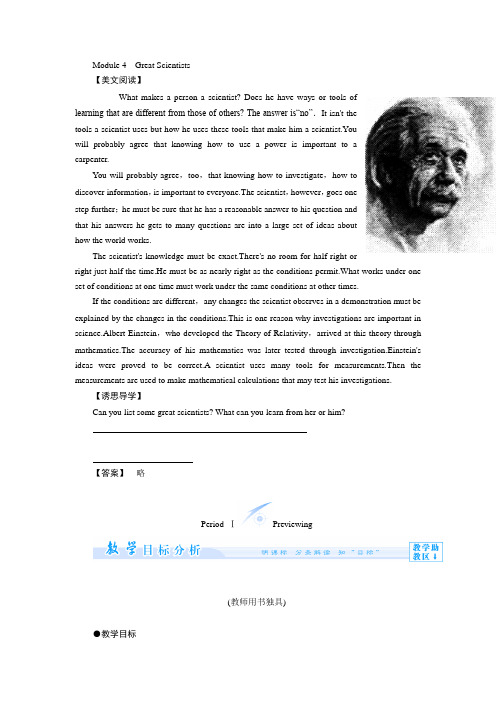
Module 4Great Scientists【美文阅读】What makes a person a scientist? Does he have ways or tools oflearning that are different from those of others? The answer is“no”.It isn't thetools a scientist uses but how he uses these tools that make him a scientist.Youwill probably agree that knowing how to use a power is important to acarpenter.You will probably agree,too,that knowing how to investigate,how todiscover information,is important to everyone.The scientist,however,goes onestep further;he must be sure that he has a reasonable answer to his question andthat his answers he gets to many questions are into a large set of ideas abouthow the world works.The scientist's knowledge must be exact.There's no room for half right orright just half the time.He must be as nearly right as the conditions permit.What works under one set of conditions at one time must work under the same conditions at other times.If the conditions are different,any changes the scientist observes in a demonstration must be explained by the changes in the conditions.This is one reason why investigations are important in science.Albert Einstein,who developed the Theory of Relativity,arrived at this theory through mathematics.The accuracy of his mathematics was later tested through investigation.Einstein's ideas were proved to be correct.A scientist uses many tools for measurements.Then the measurements are used to make mathematical calculations that may test his investigations.【诱思导学】Can you list some great scientists? What can you learn from her or him?【答案】略Period ⅠPreviewing(教师用书独具)●教学目标本课时主要是通过学生对学案所给出的内容的学习,了解本课文中所出现的词汇,初步了解课文以及相关的背景知识,对下一堂课对课文的全面理解起到一个铺垫作用。
外研版高中英语必修四备课Module 4 Great ScientistsReading教案
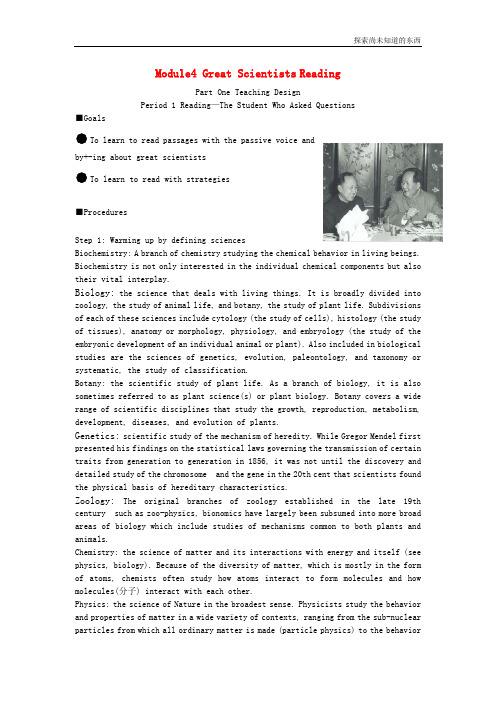
Module4 Great Scientists ReadingPart One Teaching DesignPeriod 1 Reading—The Student Who Asked Questions■Goals●To learn to read passages with the passive voice andby+-ing about great scientists●To learn to read with strategies■ProceduresStep 1: Warming up by defining sciencesBiochemistry: A branch of chemistry studying the chemical behavior in living beings. Biochemistry is not only interested in the individual chemical components but also their vital interplay.Biology: the science that deals with living things. It is broadly divided into zoology, the study of animal life, and botany, the study of plant life. Subdivisions of each of these sciences include cytology (the study of cells), histology (the study of tissues), anatomy or morphology, physiology, and embryology (the study of the embryonic development of an individual animal or plant). Also included in biological studies are the sciences of genetics, evolution, paleontology, and taxonomy or systematic, the study of classification.Botany: the scientific study of plant life. As a branch of biology, it is also sometimes referred to as plant science(s) or plant biology. Botany covers a wide range of scientific disciplines that study the growth, reproduction, metabolism, development, diseases, and evolution of plants.Genetics: scientific study of the mechanism of heredity. While Gregor Mendel first presented his findings on the statistical laws governing the transmission of certain traits from generation to generation in 1856, it was not until the discovery and detailed study of the chromosome and the gene in the 20th cent that scientists found the physical basis of hereditary characteristics.Zoology: The original branches of zoology established in the late 19th century such as zoo-physics, bionomics have largely been subsumed into more broad areas of biology which include studies of mechanisms common to both plants and animals.Chemistry: the science of matter and its interactions with energy and itself (see physics, biology). Because of the diversity of matter, which is mostly in the form of atoms, chemists often study how atoms interact to form molecules and how molecules(分子) interact with each other.Physics: the science of Nature in the broadest sense. Physicists study the behavior and properties of matter in a wide variety of contexts, ranging from the sub-nuclear particles from which all ordinary matter is made (particle physics) to the behaviorof the material Universe as a whole (cosmology宇宙论).Step 2: Before you readPlease go over the word list for this module, paying attention to the pronunciation of the word, the relationship between its pronunciation and its spelling.Step 3: While you read1. Type of writing and summaries of The Student Who Asked Questions2. A diagram of The Student Who Asked Questions3. Complete the article with one word in each blankThe Chinese scientist, Yuan Longping, is a _1_ figure in the rice-growing world. When he was educated in school he was given the _2_ , “the student who asks questions”. From an early age he was so interested in plants that he _3_agriculture in college. As a young teacher he began experimenting in crop breeding. First Yuan Longping _4_ with different types of rice. The results became known in China in 1966.Then he _5_ his search for a special type of rice plant. It had to be male. It had to be sterile. Finally, in 1970 a _6_sterile male rice plant was discovered. This was the breakthrough. As a _7 _of Yuan Longping’s discoveries Chinese rice production rose by 47.5 percent in the 1990’s. There were other _8_, too. 50 thousand square kilometers of rice fields were converted to growing _9_and other cash crops. Following this, Yuan Longping’s rice was exported to other _10_, such as Pakistan1. What does “staple” mean in “In a hungry world rice is a staple food and China is the world’s largest producer”?A. chief or prominent among the products exported or produced by a country or district; chiefly or largely dealt in or consumed.B. basic, chief, or principal: staple industries.C. principally used: staple subjects of conversation.D. important and outstanding2. He studied agriculture in college and as a young teacher he began experiments in _____.A. crop breedingB. feeding peopleC. sterile male riceD. with different types of rice3. He thought that the key to have more rice was by _____.A. experimenting with different types of riceB. asking questionsC. crossing different species of rice plantD. searching for a special type of rice plant4. Finally, in 1970 a _____ was discovered. This was the breakthrough.A. staple foodB. new plant which could give a higher yieldStep 4: After you readYou are going to read the text again and draw a diagram of it. You may use the diagram to retell the story in your own words.。
外研版高一英语必修4_Module4_Reading_词汇导图语境速记

语境助记
He searched the drawer in search of his friend’s telephone number while his friend was searching for his address, too.
他翻抽居寻找他朋友的电话号码,而他的朋友也正在寻 找他的住址。
时鲜助记
To expand external exchanges and bring in new members serve the need of a growing SCO that is inherently open and inclusive.
扩大对外交往、吸收新鲜血液,是上海合作组织自身发 展壮大的需要,也符合本组织一贯奉行的开放包容方针。
Module 4 Great Scientists
词汇导图语境助记
导图速记
discovery n.发现
discover
discover vt.发现;
了解到,查明
discover a new star 发现一颗新星 discover the truth 查明真相
discoverer n.发现者
高考佳句
水滴筹发表声明称,正在与警方合作以弄清是否 有挪用现象。
漫画助记
I desired to be tall, stately, and finely developed in figure.
我渴望长得高、气宇不凡而且身材 匀称。
导图速记
bring
bring up抚养,养育;提出;呕吐 bring in 请……做;引进;赚得 bring about引起;导致 bring back使回忆起;归还;使恢复 bring out 使表现出;阐明;出版 bring down 降低;减少;击败 bring sth.to an end 结束
外研版必修四Module4 Great Scientists Reading and Vocabulary
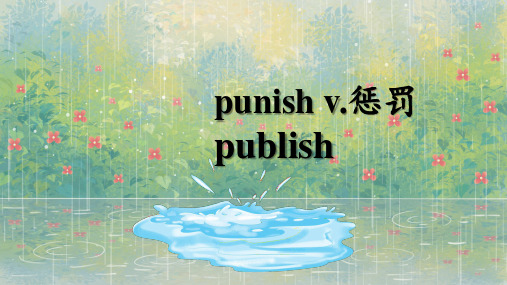
A. searching; for B. in search; for
C. searching; to D. in search; of
convert
cash crop
import
export
雷克萨斯RX450h
hybrid
agricultural
replace
Module 4 Great Scientists
Reading and Vocabulary
1. In the rice-growing world, the Chinese scientist, Yuan Longping, is a leading figure. 在水稻种植界,中国科学家袁隆平是一位重要人士。 rice-growing 为复合形容词,种植水稻的。 现在分词与所描述的人或事物之间是逻辑上的主动关系。 一个说英语的国家
5. Then he began his search for a special type of rice plant.
in search of in one’s/the search for
寻找……
search for The police with dogs are _A_ the woods __ the murderer.
-- How do you deal with the disagreement between the company and the customers? -- The key _B__ the problem is to meet the demand ____ by the customers. A. to solving; making B. to solving; made C. to solve; making D. to solve; made
- 1、下载文档前请自行甄别文档内容的完整性,平台不提供额外的编辑、内容补充、找答案等附加服务。
- 2、"仅部分预览"的文档,不可在线预览部分如存在完整性等问题,可反馈申请退款(可完整预览的文档不适用该条件!)。
- 3、如文档侵犯您的权益,请联系客服反馈,我们会尽快为您处理(人工客服工作时间:9:00-18:30)。
Thinking
1. Check the meaning of these words
Discussing
2. Read the passage about Stephen Hawking and number the paragraphs in the correct order. 3. Write the number of the paragraph.
special computer, he has become the voice of science.
3. Stephen Hawking has spent his career at Cambridge
University, where he became Professor of Physics in
4. Read the passage and answer questions.
Why is Hawking so famous? What kind of disease did Hawking suffer from? What’s the name of Hawking’s book? 5. Read the notes about Albert Einstein and write three
Lead-in
Brief History of Time is a popular-science book written by British physicist Stephen Hawking and first published by the Bantam Dell Publishing Group in 1988. It became a best-seller and sold more than 10 million copies in twenty years. It was also on the London Sunday Times best-seller list for more than four years and was translated into 35 languages by 2001.
paragraphs about Albert Einstein .
Explaining
Check the meaning of these words 1. a person who has been attacked, injured or killed as a result of a crime, an accident, etc. victim 2. to discover the cause of an illness or a problem diagnose
高一英语必修四M4
Module 4 Great Scientists
Lead-in
Look at the pictures and guess who he is. And say what you know about him
Stephen Hawking
Lead-in
Lead-in
Lead-in
Explaining
Read the passage about Stephen Hawking and number the paragraphs in the correct order.
Answer: 2, 3, 1
Explaining
Read the passage about Stephen Hawking and write the number of the paragraph. 1. This paragraph explains why Hawking is The third in the book. famous. ____________________ 2. This paragraph talks about Hawking’s personal The first in the book. life. __________________ 3. This paragraph talks about Hawking’s scientific second in the book. career. The ____________________
Explaining
Appreciate the beautiful sentences. Βιβλιοθήκη hen remember them.
1. It was discovered that he was a brilliant scientist.
2. Moving in a wheelchair and speaking through a
3. a book that sells in very large numbers best-seller 4. an illness disease 5. the study of the origin and development of the universe cosmology 6. the state of being disabled disability
1977.
Read the notes about Albert Einstein. ● born in Ulm, Germany, 1879 ● didn’t speak until he was three ● loved mathematics ● had the idea of his theory of relativity when he was 16 ● studied physics in Zurich, Switzerland ● Got a job in an office to earn his living ● published the special theory of relativity in 1905 ● became a university teacher in 1909 ● published the general theory of relativity in 1915 ● awarded Nobel Prize for physics in 1921 ● left Germany when Hitler came to power and went to work in the US ● died in 1955
Explaining
Read the passage and answer questions. 1. Why is Hawking so famous? Partly because of his scientific discoveries and partly because of his physical disability. 2. What kind of disease did Hawking suffer from? He suffered from motor neurone disease. 3. What’s the name of Hawking’s book? A Brief History of Time.
